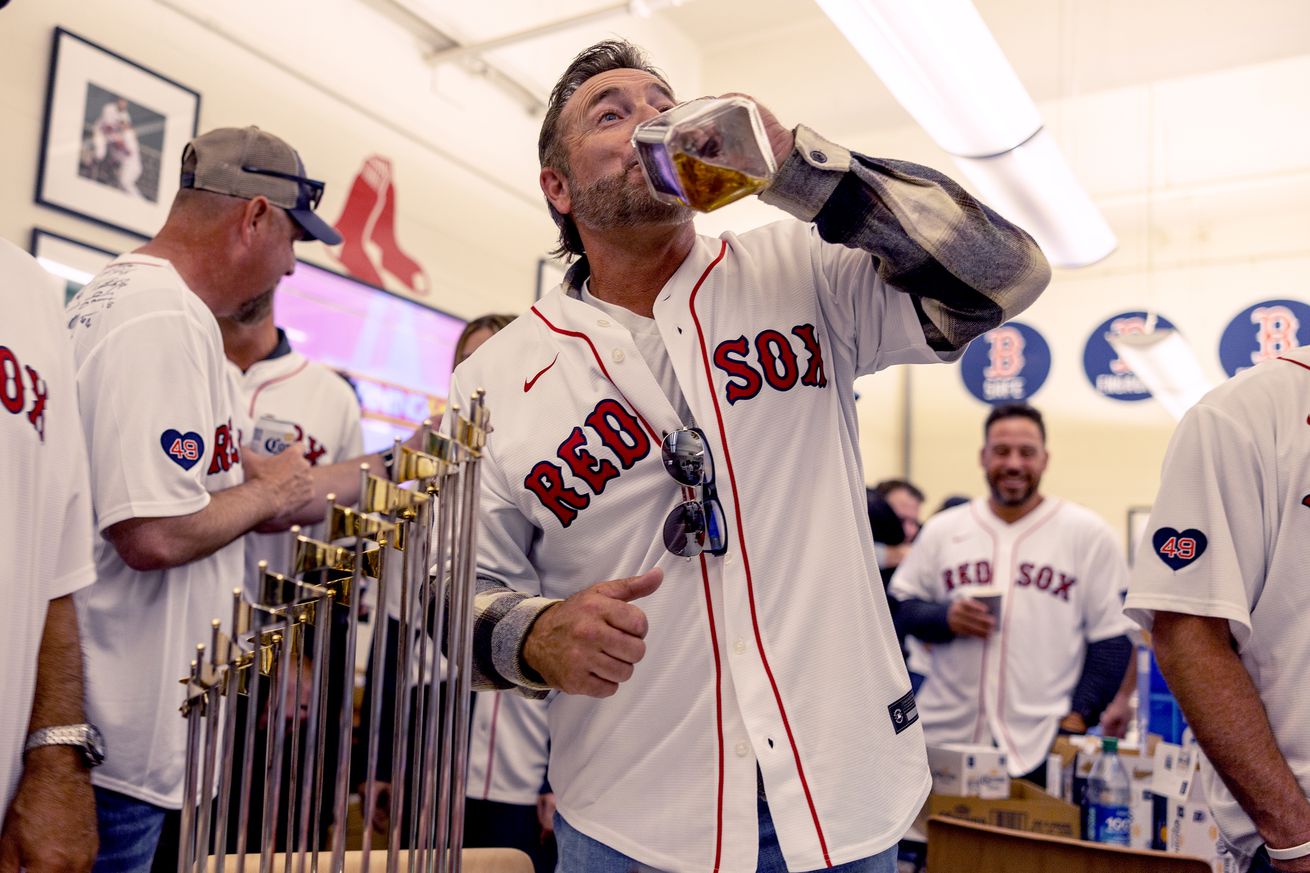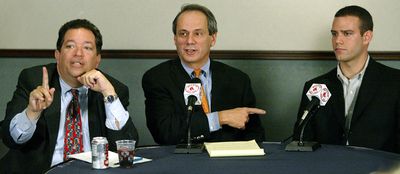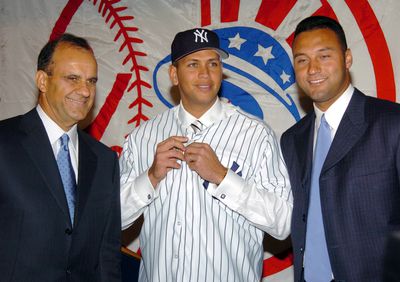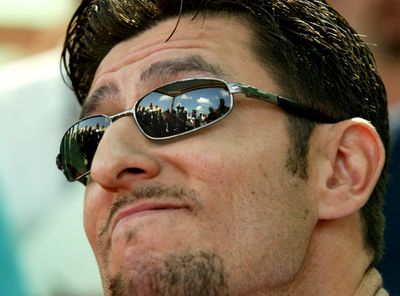
And you know why it’s 34. . .
- I’m genuinely not sure I’ve seen the subjects of a sports documentary speak with this much candor before. And it’s not just the cursing, which I’ve seen a lot of people talking about, but the vulnerability and anxiety many of the players display, as well as the numerous frank and unflattering remarks they make about other people (e.g., Theo Epstein saying that A-Rod is full of shit, then immediately realizing he probably shouldn’t have said that, then sloppily trying to save himself by saying he’s full of shit sometimes, too). That was great — and necessary — work by the filmmakers, as I’m not sure this film would even have a reason to exist without these revealing moments.
- Speaking of great work by the filmmakers, the way they introduced David Ortiz was absolutely badass. I didn’t realize it was possible to look like a gangster when you sit down to be interviewed for a documentary. Big Papi absolutely did.
- But you know who didn’t look like a gangster as he was being introduced to a global audience? Young Theo Epstein, who looked totally overwhelmed and out of his depth in the footage of his introductory press conference way back in 2002. If social media were around back then, the online reception to that press conference would have been brutal.

Photo by Jim Davis/The Boston Globe via Getty Images
- Also, I was not prepared for how dated that old footage would look and I don’t like it. I don’t like it one bit.
- When I say that I wasn’t sure that this movie had a reason to exist, I mean that I thought this story had already been documented so much that there was absolutely nothing new to say about it. I really wasn’t that excited about this project — we’d already seen everything in Four Days in October, and Faith Rewarded, and in Ken Burns’ update to Baseball. . .
- . . . And, in the first five minutes of the doc, I thought my instinct to hate on the project would prove correct. Oh look, there’s Dan Shaughnessy talking about the curse (again), there’s a central casting Sully talking about his father dying without seeing the Red Sox win the World Series (again), there’s that shot of Roger Clemens with his palms pressed together in the Shea Stadium dugout in 1986 (again). I swear I’ve seen that shot more times than I’ve seen more than my own children at this point.
- But everything started to shift as soon as Billy Bean sat down, bubbling with excitement as he recounted the 24 hours when he was the GM of the Red Sox and he and Theo began revamping the entire organization. This was something we hadn’t seen before, and I’m glad the film moved more towards people like Bean and away from the Shaughnessys and Howard Bryants of the world.
- And, really: with all due respect to Howard Bryant (whose work I really enjoy) and Shaughnessy (who, for whatever you want to say about him now, has certainly earned the right to discuss Red Sox history on camera) did we really need to hear from these two guys again? They offered absolutely nothing new or insightful. It would have been far more interesting to hear from someone like Jared Carrabis, who is currently a much more significant and relevant voice on the Red Sox than either Shaughnessy or Bryant are, and who could’ve given us the more novel perspective of what it was like to experience that era as a young fan.
- Mike Francesa, on the other hand, was a welcome addition. One thing that’s been missing from previous attempts at telling this story was more Yankee perspectives. Francesa, Gary Sheffield, and Joe Torre do a good job giving us insight into the enemy’s mindset here. If the filmmakers had been able to get Jeter and A-Rod on camera (and gotten them to speak as frankly as the Red Sox did) then this film really would’ve been something special.
- But lol at trying to get A-Rod to be frank about anything. Theo recalling the story of A-Rod making him and Jed Hoyer come up to his hotel room at 2AM while they were negotiating the trade and then greeting them in a suit and tie like they were going to negotiate a real estate deal in Montenegro was one of the most genuinely hilarious moments in the film.

Photo by Theo Wargo/WireImage
- But the funniest moment of the film (and perhaps the only laugh-out-loud moment) was the sequence in which several players said that they don’t actually remember the supposedly legendary moment when they went to the Baseball Tavern across from Fenway in full uniform immediately after clinching a postseason spot in 2003. . . followed by a jump-cut to Kevin Millar being like “that was the coolest thing that ever happened!”
- Sooooo, that definitely didn’t actually happen, right?
- Regardless of whether the Baseball Tavern story is actually true, the Jack Daniels story definitely is, and I couldn’t believe how much footage there was of the players drinking in the clubhouse. Who was even shooting that?
- It’s really unfair that the rest of us don’t get to have jobs where we can bond with our coworkers the way pro athletes do. The world would be a better place if we all got to drink and fly around the country with our colleagues from the accounting department!
- Actually, Millar had a second laugh-out-loud moment when, 21 years after the fact, he finally realized that he did actually throw Nomar under the bus while being interviewed on SportsCenter during the A-Rod trade talks.
- Nomar, of course, was the most glaring omission from the film. His absence had the effect of a ghost hovering over the entire proceedings.

Photo by Matthew West/MediaNews Group/Boston Herald via Getty Images
- Man, I can’t tell you what I would give to see a documentary about the 03-04 Red Sox told solely through Nomar’s perspective. Given everything he meant to the organization (and to all of New England, really) can you imagine what it must have felt like for him to watch all of that unfold from his couch a continent away? That’s a story that needs to be told.
- Speaking of Nomar’s rocky end, I think I’m finally ready to admit that Jeter’s run-into-the-stands catch in July 04 was a pretty nice play. This feels like a growth moment for me.
- And speaking of that catch, one of my favorite aspects of the film is the fact that it spends so much time on the 2003-04 regular seasons, as opposed to just focusing on the playoffs. Baseball is unique in that the regular season tells such a rich story, filled with heroes, villains, and plot twists. The film does a great job capturing that.
- And, likewise, the film reinforces how much damage MLB’s expanded postseason format has done to the regular season. It was refreshing to hear the story about Larry Lucchino telling Terry Francona that the 04 team’s performance was unacceptable . . . when they were 12 games over .500 at the time. In today’s game, where most teams don’t really care about winning 100 games and just want to get in the dance, no executive is going to be upset about being 12 games over .500 and comfortably in the postseason.
- And, once again, it’s clear that so much of the Red Sox’s success this century was driven by Larry Lucchino. I’m still not sure we fully understand the impact of his loss.
- Case in point: Tom Werner looking like a clown in saying that his first impression of Grady Little was “this is someone who is going to make a big mistake one day.” Come on, dude: at no point in your entire tenure as a Red Sox owner have you demonstrated that you know anything about baseball, or are even particularly interested in it. No one believes you.
- And, frankly, it’s gross that John Henry thinks that him being excited to fire Grady Little is such a cool story. Grady Little made a terrible mistake in front of a global audience that has come to define his entire life. His firing was justified, but I would prefer my empire-building billionaires to not be dicks about making someone unemployed.
- Speaking of the 2003 ALCS, one thing I’ve never really noticed before was how terrible Joe Buck’s call of Aaron Boone’s home run was. Absolutely no excitement or sense of the moment whatsoever. Haha!
- I really want to know what bar Bronson Arroyo was interviewed in. That place looks great — British pub-style snugs!
- Jed Hoyer, on the other had, appears to have been interviewed in the Old Executive Office Building.
- Pedro was, as expected, great. And this film reinforces how much we’ve lost by deemphasizing starting pitching throughout the modern game. Baseball is better when pitchers like Pedro act as protagonists who drive the story of a particularly game or series. We desperately need to figure out a way to save starting pitching.
- The pitchers don’t even have to be as good as Pedro to be interesting! Derek Lowe speaking about Game 4 of the 2004 ALCS was one of the best parts of the film. It was, frankly, shocking to see him be so open about how little confidence he had in himself going into that game. Remember that the next time someone downplays the mental and emotional aspect of baseball.
- Seriously: how did we not hear that story about the Sox finding a hot microphone hidden in their clubhouse at Yankee Stadium until now?
- The Dave Roberts steal in game four gets all the attention (I wouldn’t be surprised if a lot of younger non-Red Sox/Yankee fans incorrectly assume that steal happened in game 7), as does Curt Schilling’s bloody sock performance in game six, but game five was easily the best game of the 2004 ALCS. It deserves to be talked about a lot more.
- The Derek Lowe interview aside, I actually thought the stuff specifically about the 2004 ALCS was the weakest part of the film. It was a lot of retread stories and footage that we’d already heard and seen a million times before.
- I’m not sure I’ve really internalized the fact that Tim Wakefield is gone. What a goddamn awful thing it is to die young.
- I’ve already seen a lot of younger fans express regret that they never got to experience this in real time and, yeah, they’re right to feel that way. As much fun as it is to relive these moments on film, it sucks that we’ve lost so much passion for the Red Sox and for the rivalry in 20 years. Which is why, of all the films that have been made about the 2004 Red Sox, this is the one I’ll show to my children when they get a little older. It does such a good job capturing the constant hum of explosive tension that was the Red Sox-Yankees rivalry at the turn of the millennium. I feel so lucky to have had that in my life as a sports fan and I desperately want to have it again.
- But we never will, and we know that.